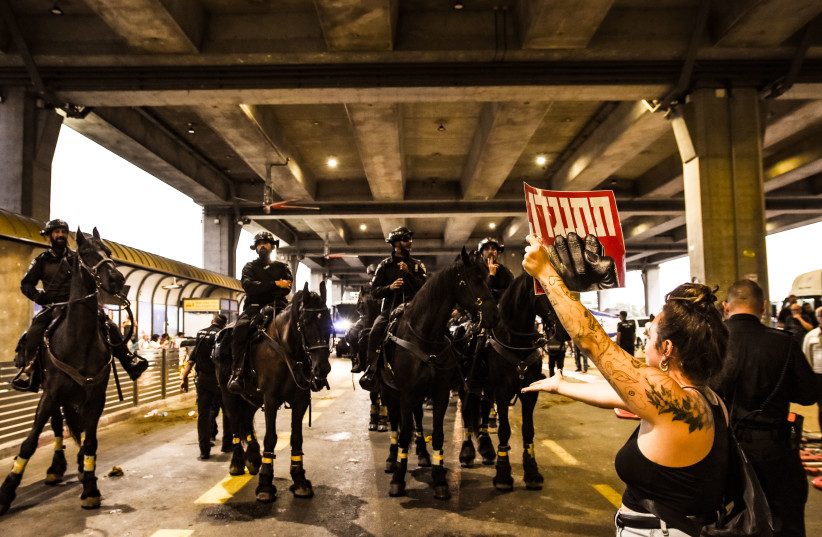Anti-Judicial reform protests at Ben-Gurion Airport are not prohibited by law but Israel Police and the Airport Authority can set limits on the demonstrations, the Attorney-General's Office said on Tuesday amid renewed mass rallies against the advancement of reasonableness standard legislation.
Ben-Gurion Airport is a public place open to all citizens to express themselves and demonstrate, Deputy-Attorney General Avital Sompolinsky wrote on Tuesday morning, but its importance to the broader public and sensitivity to safety and security concerns also had to be taken into account.
"These unique characteristics should be reflected in the framework of the concrete balances that must be made in relation to the time, location and character of the protests on the spot," said Sompolinsky.
How much can police limit protests at the airport?
The Israel Police have legal authority to set conditions for time, place, and manner of protests to maintain public order, safety and peace, and the Airport authority has the legal authority to determine conditions for all gatherings on airport grounds. Sompolinsky said that this included speeches and waving of flags. The Airport Authority can also prevent people from entering the building based on not having a ticket for a flight that day.
Transportation Minister Miri Regev responded to the Attorney-General's Office by saying that she would change the law about congregations at the airport.

"Ben-Gurion Airport is not a shopping mall or public space," said Regev. "Ben-Gurion Airport is a strategic national asset, which requires sensitive and complex handling in the face of current aviation challenges and emergency situations."
Sompolinsky said it was necessary for the police and Airport Authority to coordinate about the conditions of protests, as they had done so far. The Israel Police have a duty to ensure the right to protest, but to also balance this with their professional and operational concerns, she said.
Minister for the Negev and Galilee Yitzhak Wasserlauf said that the Attorney-General's Office failed to address the main issues at hand, the ongoing selective enforcement of the law.
"The problem is not with legal demonstrations, but with those who violate public order contrary to the law and guidelines," said Wasserlauf.
A senior government official said that the position of the Attorney-General's Office turned the citizens of Israel into hostages of a minority and caused harm to those seeking to travel out of the country.
At the outset of the protests, Central District Police Commander Avi Biton called on travelers to come early and used public transportation to avoid congestion. Biton also said that protesters should "show responsibility and leave the roads in the airport and the terminal available to the emergency and rescue organizations."
As protesters gathered inside Ben-Gurion's terminal 3, the police declared the gathering illegal and removed dozens of protesters from the reception hall.
Police also engaged protesters at key traffic arteries, seeking to undo the blockade erected by demonstrators. Police also said that they had employed riot control measures in some areas. Videos circulating online showed policemen on horseback and foot pushing back protesters. Biton said the objective was to ensure public safety and routine. By the afternoon, police said that they had arrested 71 protesters for disturbing public order. 45 of the demonstrators were released. Protest groups said that they held demonstrations at precincts at which people were detained.
"The Israel Police will continue to allow freedom of expression and protest within the limits of the law, but will not allow violation of public order, disruption of traffic regulations or endangering motorists."
The day saw bouts of violence, with two people alleged by the police to have attacked officers. One, a journalist, was claimed by police to have punched an officer. Police also claimed that one person in Jerusalem had hit a police horse with a wooden stick. The police reported that a flare was lit under a police car in the Kaplan street area in Tel Aviv, at the heart of the protests.
Protester groups said that police acted violently and aggressively during the multiple exchanges, pushing demonstrators to the ground and using excessive physical force to move them. Water cannons were employed despite recent warnings by medical practitioners about the damage that they could do.
